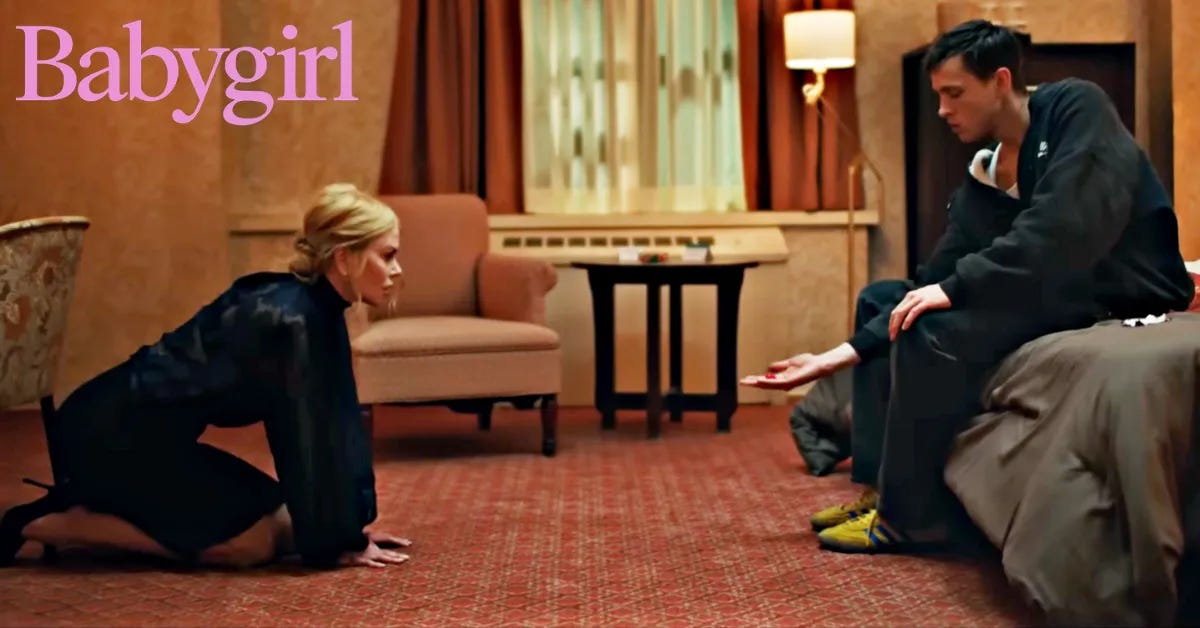Babygirl is a remarkably bad movie.
I went into it with some anticipation. The high concept from the trailer—Fatal Attraction with an homme fatale—was intriguing, and I have high regard for Nicole Kidman’s body of work. This was a courageous role for her to take, and her acting here is as strong as ever. (Credit is also due to Antonio Banderas for embracing what is also a difficult role as a cuckolded husband.) I figured that Dutch writer/director Halina Reijn would use the scenario to fashion some kind of feminist statement—presumably the reason why Kidman would sign on to the project—which was ok with me, curious to see how they would make it work.
Early on, I realized it wouldn’t.
Kidman plays Romy, a successful CEO for a logistics firm married to theater director Jacob (Banderas). They have two adolescent daughters (Vaughn Reilly and Esther Rose McGregor), the latter of whom is a non-monogamous lesbian of whom both parents are strongly supportive. But Romy’s seemingly idyllic life, plagued by unfulfilled sexuality, takes a dramatic turn when she allows herself to be seduced by a young male intern named Samuel (Harris Dickinson), who dubs her “Babygirl” and whose power plays become increasingly dangerous to her position, presumably because that’s the way Romy, who yearns for passivity, likes it. Samuel is a cipher, the first of many weaknesses in the screenplay. Naturally in a story like this, he overplays his hand, the situation explodes, and it’s then that the movie’s moral calculus—or lack thereof—finally comes into focus. The center of which is female empowerment. At the expense of just about everything else.
The first thing that has to happen for such an affirmation is that class politics have to get thrown overboard. Romy is, by definition, at the apex of corporate power in the story. And yet she becomes the plaything of her underlings. Not just Samuel, who flirts with blackmail pretty much from the start, but also her black protégé Hazel, whose race implicitly matters as a source of moral authority to challenge her boss as a major disappointment in female leadership. It is a curious aspect of corporate politics in the 2020s that management has reason to fear ideologically minded employees whose opposition endangers their jobs. (It was widely reported that this was a major factor in Kamala Harris’s decision not to appear on Joe Rogan’s podcast in last year’s presidential race.) One would think that anyone who has attained Romy’s status would have both the acumen and the administrative levers to dispatch a problematic employee far more easily than the other way around. Not that it couldn’t happen, but amid the tiresome background pieties about companies as fields of self-actualization, possibly meant as a joke, the movie never really takes the prevailing realities of class seriously—or really grapples with the implications after Romy finally does clumsily threaten Hazel. (Hazel makes short work of her, leading one to wonder how Romy attained the position she had in the first place. In this regard, her straying tresses seem like an index of disorder from the start.) But in the end Romy has to be the victim, and so weakness becomes the basis of her claim for our sympathy.
The facts of the matter are that Romy cheats on her husband, endangers her relationship with her children, and by the prevailing laws of corporate governance, commits sexual harassment (her half-hearted attempts to end her addiction to Samuel on this basis only seem pathetic). Not right no matter who does it. But there is no reckoning for any of that. Instead, Romy gets to seize the high ground when an old white corporate whale tries to exploit her weakness, and we see her righteously put him in his place because, in the end, nothing is worse than the original sin of patriarchy. The suspense of Babygirl becomes a matter of learning Romy deciding what is most important in her life. Which is good sex.
The notion of the willful, reckless heart is one of the great and timeless themes of art, which is why a skillfully marketed movie like Babygirl will always have some appeal as a premise, especially when the formula gets tweaked as it does here. But in the really great stories in this realm such as Thomas Mann’s Death in Venice or Vladmir Nabokov’s Lolita, there is a price to be paid for transgression. Even in less extreme or repugnant versions in such stories of illicit desire (like, say, Edith Wharton’s The Age of Innocence), the protagonists incur a painful cost but gain wisdom, even meaning, from the gift of a sense of sin—of limits that provide order, structure, and value to everyday life. But in the world of Babygirl, a sense of sin as a gift? Inconceivable.



